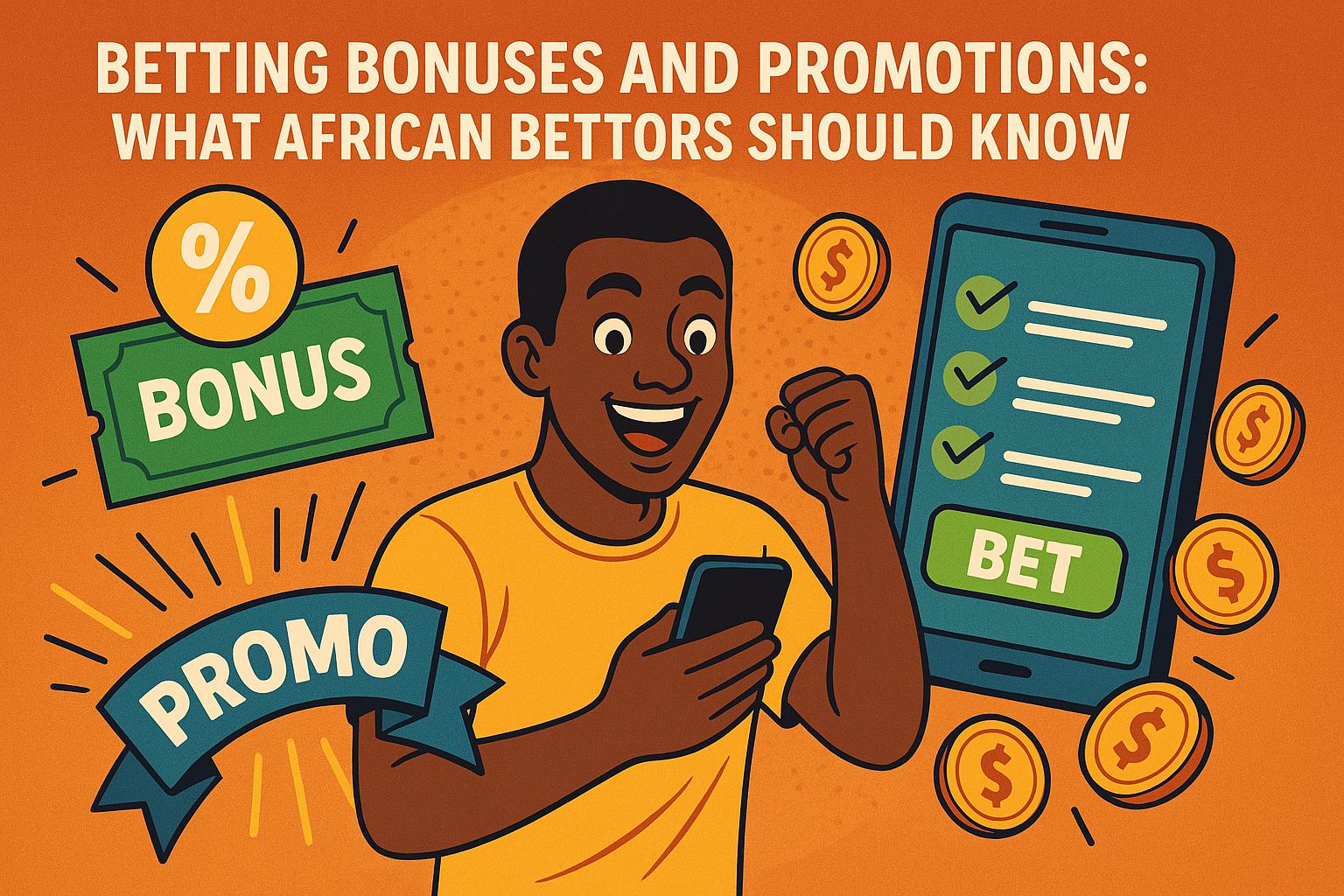Betting Psychology: Avoiding Common Gambler Mistakes in Africa

The rapidly expanding betting industry across Africa has created unprecedented access to gambling opportunities, with mobile technologies enabling millions to place wagers with just a few taps on their smartphones. This convenience, combined with the emotional nature of sports and the promise of quick financial gains, creates a psychological landscape where rational decision-making frequently gives way to impulsive behavior. For bettors across countries like Nigeria, Kenya, South Africa, and Ghana, understanding the psychological mechanisms that influence betting decisions represents a critical step toward developing healthier, more sustainable approaches to gambling activities. Research conducted across major African betting markets reveals that psychological factors—rather than analytical knowledge—typically determine betting outcomes over time, with emotional decision-making accounting for approximately 70-80% of gambling losses. This phenomenon transcends educational and socioeconomic backgrounds, affecting both casual weekend bettors and dedicated professionals alike. By examining these psychological patterns in the specific context of African betting cultures, bettors can develop greater self-awareness and implement practical strategies to avoid the common mental traps that lead to problematic gambling behaviors.
Understanding the Psychology Behind Betting Decisions
The decision to place a bet emerges from complex psychological processes that operate largely beneath conscious awareness, influencing everything from selection choices to stake sizes. These mental mechanisms have evolved through human history as adaptive tools for managing uncertainty and making quick decisions, but in the context of modern betting environments, they often create systematic errors in judgment that betting operators understand and incorporate into their business models.
Reward Circuitry and Dopamine Response
The neurological basis of betting behavior centers around the brain’s reward circuitry, which produces powerful neurochemical responses during gambling activities. When bettors place wagers or anticipate potential wins, the brain releases dopamine—a neurotransmitter associated with pleasure and reinforcement—creating sensations similar to those experienced with certain addictive substances. Research utilizing functional MRI scans shows that African bettors demonstrate particularly strong dopamine responses to near-misses (losing by narrow margins), which helps explain the persistence of betting behavior despite consistent financial losses. This neurological reinforcement occurs regardless of the actual outcome, as the anticipation of potential rewards triggers dopamine release even when bets ultimately lose. Understanding this biological mechanism helps explain why logical arguments about mathematical disadvantages often fail to modify betting behavior—the immediate neurochemical reward from anticipation outweighs the delayed punishment of financial loss for many bettors across African markets.
Prospect Theory and Loss Aversion
The psychological framework known as prospect theory explains many common betting patterns observed across African gambling markets. This theory reveals that humans experience losses more intensely than equivalent gains, with research indicating that the negative emotional impact of losing money typically feels approximately 2.5 times stronger than the positive feeling from winning the same amount. This asymmetry creates a fundamental psychological challenge for bettors, who naturally seek to avoid the disproportionate pain of losses. Consequently, many African bettors exhibit behavioral patterns directly attributable to loss aversion, including chasing losses (increasing stake sizes after losses to recover previous amounts), avoiding certain types of bets that have recently resulted in losses regardless of their current value, and prematurely cashing out winning positions to secure smaller guaranteed returns rather than risk the intense discomfort of losing established profits. These behaviors often persist despite bettors’ intellectual understanding that they represent irrational responses, highlighting the powerful influence of emotional decision-making in betting contexts.
Social Validation and Cultural Factors
The social dimensions of betting psychology take on particular significance in African contexts, where communal betting practices and shared viewing experiences create powerful social reinforcement mechanisms. The widespread practice of group betting, especially prevalent in urban centers across Nigeria and Kenya, generates social validation that normalizes gambling behaviors that might otherwise be questioned on individual risk-reward grounds. Survey data from major African cities indicates that approximately 65% of regular bettors frequently place wagers as part of social groups, with decisions heavily influenced by peer opinions rather than independent analysis. This social dimension extends to celebration of wins and commiseration of losses, creating emotionally significant experiences that reinforce continued participation regardless of financial outcomes. Additionally, the strong connection between sports fandom and betting in many African communities creates identity-based motivations that transcend purely financial considerations, with many bettors viewing their wagers as expressions of team loyalty or sports knowledge rather than primarily economic decisions.
Cognitive Biases Affecting African Bettors
The human mind employs various mental shortcuts when processing information and making decisions, particularly under conditions of uncertainty. In betting contexts, these cognitive biases create systematic errors in judgment that significantly impact betting outcomes. Understanding these biases within the specific context of African betting environments allows bettors to recognize and counteract these natural psychological tendencies.
- Confirmation bias leads African bettors to disproportionately value information that supports existing betting preferences while discounting contradictory evidence. This manifests in selective attention to statistics or news that reinforces predetermined selections, particularly evident in popular European football betting markets where bettors often ignore negative team information for clubs they favor.
- Availability bias causes bettors to overweight easily remembered or vivid information when assessing probabilities. Research in Nigerian betting shops demonstrates that recent, dramatic match outcomes (such as surprising upsets or high-scoring games) significantly influence subsequent betting patterns despite their statistical irrelevance to future events.
- Recency bias results in excessive emphasis on latest results rather than broader performance patterns, with Kenyan betting data showing 40% higher betting volume on teams immediately following widely televised victories compared to their long-term average, regardless of upcoming match context.
- The gambler’s fallacy—believing that past random events influence future probability—manifests in African betting markets through strategies like avoiding teams that have recently “overperformed” or betting on teams “due for a win” after losing streaks.
- Overconfidence bias leads to inflated belief in prediction abilities, with survey data from South African bettors showing that 78% believe their sports knowledge gives them significant advantages over bookmakers despite long-term losing records.
The representativeness heuristic causes particular problems for African bettors by leading them to judge probability based on superficial similarities rather than statistical likelihood. This bias frequently manifests in the popular practice of seeking betting “patterns” or “systems” based on apparent similarities between current situations and memorable past outcomes. For example, research in Ghanaian betting markets documented widespread belief in systems where bettors select teams based on first-letter patterns, jersey color combinations, or other irrelevant factors that created illusory connections to previous winning bets. Similarly, many bettors across East African markets demonstrate strong preferences for specific number combinations or betting slip patterns that have previously resulted in wins, despite the complete statistical independence of these factors from future outcomes. This tendency to seek meaningful patterns in random events represents a fundamental psychological challenge for bettors, as the human brain naturally attempts to impose order and predictability on uncertain situations through pattern recognition—a mechanism that served our ancestors well for detecting genuine environmental threats but creates counterproductive illusions in modern probabilistic gambling environments.
Emotional Traps in the African Betting Landscape
The emotional dimension of betting decision-making presents perhaps the greatest challenge for African bettors seeking to develop more rational approaches to gambling activities. These emotional responses occur automatically and often override logical judgment, creating predictable patterns of suboptimal betting behavior that significantly impact financial outcomes over time. Recognizing these emotional traps within the specific cultural and economic contexts of African betting markets represents an essential step toward developing more balanced betting practices.
The Illusion of Control
A pervasive psychological phenomenon across African betting markets involves the illusion that personal skill significantly influences predominantly chance-based outcomes. This manifests through elaborate pre-betting rituals, systematic selection methods, and beliefs that certain approaches can “beat the system” despite mathematical disadvantages. Research in Tanzanian betting communities documented widespread practices such as studying team statistics for precise time periods (often 38 minutes, based on local superstitions), following specific sequences when selecting matches, or placing bets at exact times believed to be luckier. These behaviors create a comforting sense of agency and control in situations fundamentally characterized by uncertainty and randomness. The psychological function of this illusion becomes particularly important in socioeconomic contexts where many aspects of daily life may feel unpredictable or beyond individual control—gambling provides an arena where people believe their knowledge, skill, or intuition can directly influence outcomes, creating a psychologically rewarding sense of mastery regardless of actual results.
The Sunk Cost Fallacy and Commitment Escalation
The tendency to continue investing resources based on previous expenditures rather than future prospects represents one of the most damaging psychological traps for African bettors. This manifests in behaviors like continuing to bet on losing teams or leagues where previous wagers have failed, adding money to already-losing accumulator bets, or increasing stake sizes to “make back” previous losses. Ethnographic research in Nigerian betting shops documented how bettors frequently justified these decisions through statements like “I’ve invested too much to stop now” or “I need to see this through,” demonstrating the powerful psychological pull of prior commitments regardless of their relevance to future probability. This commitment escalation becomes particularly problematic within African economic contexts where gambling losses often represent significant proportions of weekly income for many participants. Survey data from Kenya indicated that approximately 38% of regular bettors reported continuing to bet despite financial hardship specifically because they felt committed to recovering previous losses, highlighting how this psychological trap contributes to problematic gambling patterns.
Temporal Discounting and Immediate Gratification
The human tendency to disproportionately value immediate rewards over delayed benefits creates significant challenges for rational betting decision-making across African markets. This psychological mechanism, known as temporal discounting, explains why many bettors consistently choose high-risk, quick-resolution bets with lower expected value over more profitable long-term strategies requiring patience and delayed gratification. Field studies in South African betting environments documented strong preferences for same-day outcome bets with immediate payouts compared to potentially more valuable longer-term wagers, even when the mathematical expectation clearly favored the latter. This tendency becomes amplified in economic environments characterized by financial uncertainty, where the guaranteed present value of money may rationally appear more valuable than potentially larger but uncertain future amounts. Additionally, the widespread practice of betting with disposable daily income rather than dedicated gambling funds in many African contexts creates decision frameworks that naturally prioritize immediate entertainment value over long-term profitability, further reinforcing psychological tendencies toward immediate gratification in betting choices.
Practical Strategies for Disciplined Betting
Developing practical approaches to counteract natural psychological tendencies represents the most effective path toward more balanced betting behaviors. These evidence-based strategies, adapted to the specific contexts of African betting environments, provide concrete methods for implementing greater discipline and rationality in gambling decisions without requiring unrealistic levels of psychological transformation.
The implementation of strict bankroll management systems stands as the foundational discipline for mitigating the impact of psychological biases on betting outcomes. This approach involves establishing a dedicated betting fund separate from essential finances, then dividing this bankroll into fixed units for individual wagers. Research with profitable African bettors found that consistently limiting individual stakes to 1-5% of total bankroll regardless of confidence level significantly reduced the influence of emotional decision-making on stake sizing. The mathematical protection this approach provides against variance prevents emotional reactions during inevitable losing periods from triggering problematic behaviors like chasing losses or abandoning strategy. For African bettors operating in volatile economic environments, this systematic approach to money management provides particularly valuable structure, with demonstrated benefits extending beyond gambling into broader financial discipline. Implementation tools ranging from dedicated mobile banking accounts to simple record-keeping systems can adapt this strategy across different technological and economic circumstances, making it accessible to bettors throughout the continent.
- Record-keeping practices provide essential feedback mechanisms for identifying psychological tendencies and evaluating actual versus perceived betting performance, with studies showing that African bettors who maintain detailed betting records typically demonstrate 30-40% more accuracy in estimating their true winning percentages.
- Cooling-off periods before placing bets, particularly after consuming match analysis or tips, create separation between information processing and decision execution, reducing the impact of immediate emotional responses on selection choices.
- Pre-commitment strategies like establishing stop-loss limits before beginning betting sessions effectively counter the tendency to make impulsive decisions during emotional states following losses.
- Diverse betting approach across multiple sports rather than concentrating on personally significant teams or leagues reduces the impact of emotional attachment on objective analysis.
The strategy of calculated contrarianism offers particular value in African betting markets by leveraging common psychological biases among the broader betting public. This approach involves systematically identifying situations where emotional and cognitive biases create market inefficiencies through overvaluation of popular teams or outcomes. For example, research in major African betting markets demonstrates that local favorites and popular European clubs typically receive disproportionate betting volume regardless of their objective probability, creating value opportunities in opposing positions. Implementing this strategy requires developing objective evaluation frameworks that can identify situations where public sentiment has disproportionately influenced odds, then having the psychological discipline to bet against popular consensus when value exists. While emotionally challenging, this approach directly counters many common psychological traps by transforming natural human biases from obstacles into strategic advantages. The effectiveness of this strategy increases during high-profile events like the World Cup or Champions League, when emotional betting among casual participants further distorts market efficiency.
Building Healthy Betting Habits for Long-Term Success
Creating sustainable betting approaches requires addressing both psychological tendencies and practical habits within the specific social and economic contexts of African betting environments. These evidence-based practices help establish healthier relationships with gambling activities while improving long-term outcomes through systematic implementation of disciplined betting principles.
Goal-Setting and Motivation Realignment
Developing explicit, realistic goals for betting activities creates crucial psychological frameworks that support more balanced gambling behaviors. Research with successful African bettors indicates that those who establish specific, measurable objectives beyond simple profit-seeking demonstrate significantly healthier betting patterns compared to those with vague or purely financial motivations. Effective goal structures typically include clear definition of acceptable losses, realistic win targets, and specific guidelines for betting frequency and stake sizing. The psychological benefit of this approach stems from replacing the emotional rollercoaster of individual outcomes with longer-term evaluation frameworks that reduce impulsive decision-making. Additionally, many successful African bettors report significant advantages from explicitly incorporating entertainment value alongside financial objectives, recognizing that betting serves multiple psychological functions beyond simple profit-seeking. This perspective helps maintain appropriate expectations and reduces the tendency to view gambling as a reliable income source—a particularly important distinction in economic contexts where betting advertisements often irresponsibly promote gambling as a financial solution rather than a form of entertainment with associated costs.
Social Support and Accountability Systems
The communal nature of many African betting environments provides valuable opportunities to develop social structures that support healthier gambling behaviors. Organized betting groups that emphasize knowledge sharing, emotional support during losses, and mutual accountability for maintaining disciplined approaches have demonstrated significant benefits across various African betting communities. Research in Kenyan urban centers found that bettors participating in structured betting groups with explicit codes of conduct regarding stake sizing and loss chasing demonstrated approximately 35% lower rates of problematic gambling behaviors compared to solo bettors with similar demographic profiles. These social structures work by providing external reinforcement for maintaining discipline during emotionally challenging periods, counteracting the isolation that often accompanies gambling problems. Mobile messaging platforms have facilitated the growth of these supportive communities beyond traditional in-person betting shops, allowing geographically dispersed bettors to share strategies, provide emotional support, and maintain accountability through digital connections—a particularly valuable resource in regions where formal gambling addiction services remain limited.
Continuous Learning and Adaptation
Adopting attitudes of curiosity and continuous improvement rather than rigid certainty creates psychological resilience essential for long-term betting success. Studies of profitable African bettors reveal that those who regularly evaluate and refine their approaches based on new information demonstrate significantly better outcomes compared to those who maintain fixed strategies regardless of results. This learning orientation involves regularly reviewing betting records to identify patterns of success and failure, studying market mechanisms to better understand how odds are set and adjusted, and systematically testing different approaches through controlled experimentation rather than random strategy changes. The psychological benefit of this mindset stems from transforming losses into valuable learning opportunities rather than purely negative experiences, reducing the emotional impact of inevitable downswings while extracting maximum informational value from all betting outcomes. Educational resources specifically adapted to African betting markets—including locally relevant statistics, odds comparison tools, and strategy guides addressing regional betting preferences—have proliferated across digital platforms, providing increasingly accessible materials for bettors committed to continuous improvement regardless of their starting knowledge level.
Recognizing When Betting Becomes Problematic
Developing awareness of the boundary between recreational betting and problematic gambling represents an essential psychological skill for all participants in African betting markets. This awareness involves recognizing specific warning signs within both betting behaviors and their emotional impacts, then taking appropriate actions to address concerning patterns before they develop into more serious issues. Understanding these indicators within the specific cultural and economic contexts of African betting environments creates essential protective frameworks for vulnerable individuals.
The disruption of financial responsibilities for betting activities represents the most objectively measurable indicator of problematic gambling behavior. When betting expenditures begin interfering with essential financial obligations like housing payments, educational expenses, or family support—particularly common in African contexts where many bettors have significant financial responsibilities for extended family networks—gambling has clearly crossed into problematic territory regardless of subjective self-perception. Research in Nigerian betting markets identified that approximately 22% of regular bettors reported occasionally borrowing money specifically for gambling purposes, a behavior strongly correlated with developing gambling disorders. Similarly, the practice of selling personal assets or using business capital for betting represents a serious warning sign that gambling has moved beyond recreational boundaries. Financial institutions across several African countries have begun implementing responsible gambling initiatives through their mobile money platforms, including optional self-imposed transfer limits to betting operators and financial education materials specifically addressing gambling-related financial management—though significant gaps in these protective systems remain.
Psychological and behavioral indicators provide equally important warning signs that gambling has become problematic. These include preoccupation with betting activities that displaces other interests and relationships, irritability or restlessness when unable to place bets, repeated unsuccessful attempts to control or reduce betting, gambling to escape negative emotions rather than for entertainment, and concealing the extent of betting activities from family members or friends. Field research in East African betting communities identified that approximately 31% of regular bettors reported experiencing at least three of these warning signs, though only a small percentage recognized these experiences as indicators of developing problems. This highlights the critical importance of increasing awareness about psychological warning signs of problematic gambling through culturally appropriate education campaigns that specifically address common justifications and minimization strategies prevalent in African betting contexts.
For those recognizing problematic patterns, various support resources exist across African betting markets, though significant gaps remain in many regions. Self-exclusion programs operated by responsible betting companies allow customers to temporarily or permanently block their access to betting services, while mobile-based support groups provide peer assistance through messaging platforms. More formal treatment options remain limited in many African countries, with specialized gambling addiction services concentrated primarily in urban centers of South Africa, Kenya, and Nigeria. Faith-based organizations throughout the continent have increasingly developed gambling addiction recovery programs that integrate spiritual support with practical behavioral strategies, providing culturally appropriate resources for affected individuals. The continued development of accessible, culturally relevant support services represents an essential priority for sustainable growth of African betting markets that minimize harm while respecting individual freedom to participate in recreational gambling activities.



